2014年自考英语(二)资料(_unit_6)
- 格式:doc
- 大小:98.00 KB
- 文档页数:11
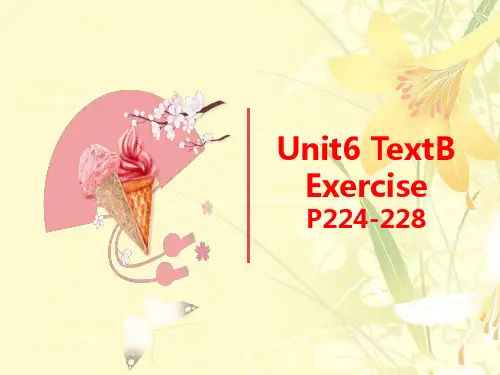
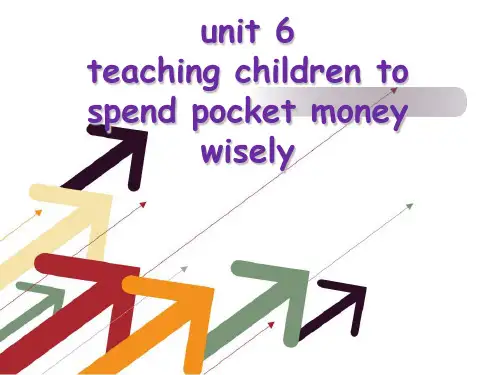
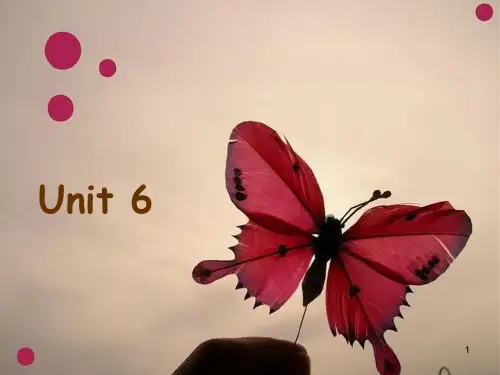
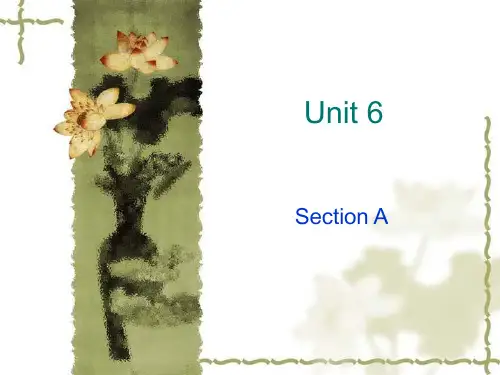
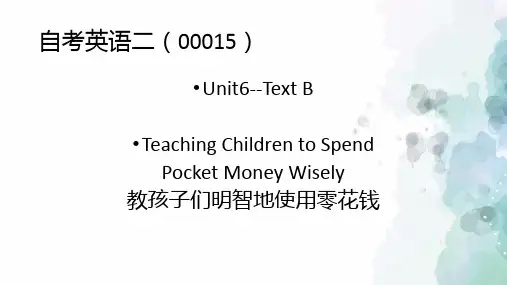
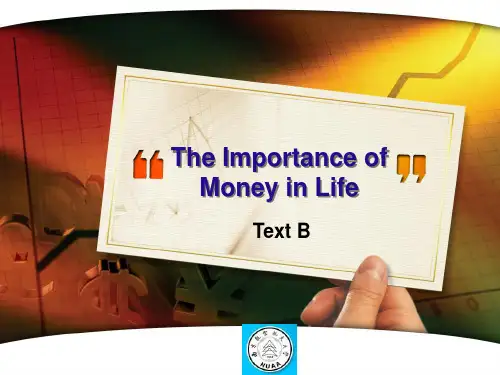
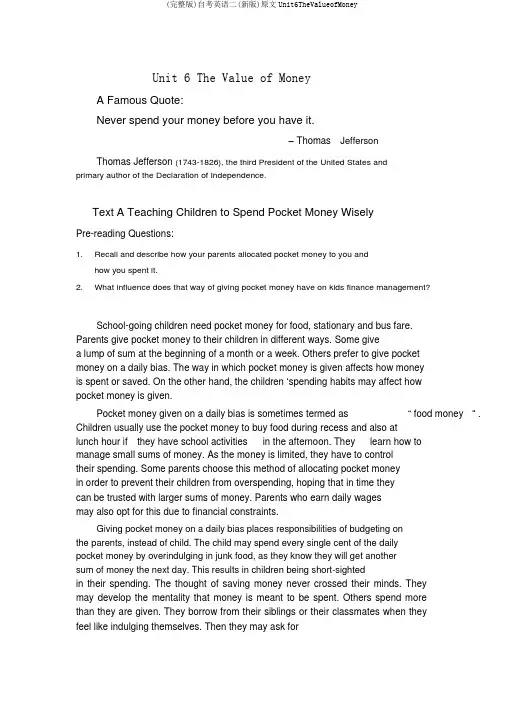
Unit 6 The Value of MoneyA Famous Quote:Never spend your money before you have it.–Thomas JeffersonThomas Jefferson (1743-1826), the third President of the United States andprimary author of the Declaration of Independence.Text A Teaching Children to Spend Pocket Money WiselyPre-reading Questions:1.Recall and describe how your parents allocated pocket money to you andhow you spent it.2.What influence does that way of giving pocket money have on kids finance management?School-going children need pocket money for food, stationary and bus fare.Parents give pocket money to their children in different ways. Some givea lump of sum at the beginning of a month or a week. Others prefer to give pocketmoney on a daily bias. The way in which pocket money is given affects how moneyis spent or saved. On the other hand, the children ’spending habits may affect howpocket money is given.Pocket money given on a daily bias is sometimes termed as“ food money” . Children usually use the pocket money to buy food during recess and also atlunch hour if they have school activities in the afternoon. They learn how tomanage small sums of money. As the money is limited, they have to controltheir spending. Some parents choose this method of allocating pocket moneyin order to prevent their children from overspending, hoping that in time theycan be trusted with larger sums of money. Parents who earn daily wagesmay also opt for this due to financial constraints.Giving pocket money on a daily bias places responsibilities of budgeting onthe parents, instead of child. The child may spend every single cent of the dailypocket money by overindulging in junk food, as they know they will get anothersum of money the next day. This results in children being short-sightedin their spending. The thought of saving money never crossed their minds. Theymay develop the mentality that money is meant to be spent. Others spend morethan they are given. They borrow from their siblings or their classmates when theyfeel like indulging themselves. Then they may ask formoney to pay off their debts. This habit of borrowing causes then to dependon others to solve their problems. In such instances, the purpose of rationingis defeated.Children need to learn how to budget their money. Some parents go bythe “ learning by doing ”principle and give their children lump sums at the beginningof the month, and by the third week of the month their account is already dry.On the other hand, some learn to budget their pocket money very well andeven have savings at the end of the month. They do not borrow moneynecessarily. In other words, they learn to spend within their means. Buy thenecessary first, and indulge ourselves only if there is money left. This habit,when inculcated since young, stands them in good stead when they startworking and earning their own money. It enables them to resist the temptationof “ buy now and pay later ” schemes.Formation of any habit starts at a tender age. There is no better way to teachchildren to manage money than to start with their pocket money. They need to learnthe importance of budgeting right from kindergarden days. It is a good idea to startwith daily pocket money and move on to monthly pocket money. When childrenlearn to spend within their means, they are able to manage their finances well laterin their lives.Text B The Importance of Money in LifePre-reading Questions:1. What do you think of the old saying,“ money is the root of evil”?2.Do you believe how people think about money determines whether theirmoney flow is constant?What were you taught about money as you were growing up? Somethinglike“ money doesn’ t grow on trees” , or“ money is the root of all evil” , or ma “ all rich people are greedy’?Well, how do you expect to become a success financially if you believethese things? You attract into you life what you are thinking about and whatyou believe. If you think there is not enough money in this world for everyoneyou will never have enough money. That is called the Law of Attraction.First o f all, believing that “ money doesn ’ t grow on trees ” is an example of what ’ s calledlack or scarcity programming. Our parents taught us that therewas never enough money to go around, and that it was not readily available orabundant. But in truth, the universe is very abundant, and there is lots of money asyour heart desires. What wonderful thing you could do with it: travelto the countries you have always dreamt of, buy a house you are evenscared to think about, attend meditation classes so you could spiritually grow,donate money to your favorite charity, spend more quality time with yourfamily, and the list goes on.The key is to start thinking that you deserve the money and that there islots of it available for your, and then you can start attracting in into your life.That ’ s abundance thinking, which is the opposite of lack or scarcity thinking.When you start thinking about abundance the Law of Attraction will do the rest.You do not need to know how it is going to happen. Just make the first step,first thought. Starting is already winning.And what about thinking that “ money is the root of all evil expect to” ? Can you really become a success if you believe that money is the root of all evil? Unlessyou have a desire to be an evil person, your subconscious will not let youhave money if you believe deep down that it is the root of evil.By the way, the quote is taken out of context in the first place. It wasoriginally stated as“ the love of money is the root of all evil” . So it has nothing do with the money itself.Now that you understand that, you can start to think that money is in factgood. You can help people with money. You can stimulate the economy with’ t need money. Even the most kind- hearted spiritual person, who says they donmoney, can do more to make the world a better place with money thanwithout it.And what about thinking that “ allrich people are greedy ’ ?Well, thatcreates us versus them, whereby you have labeled all of“ them” greedy in your mind. You, on the other hand, are very giving in your mind. That ’ swhy youdon’ t have money, because you’ re not greedy.Sure, there must be some rich people in the world who are greedy. Butthere are also poor people who are greedy. There are both rich and poor peoplewho are very giving as well. The amount of money you have has nothing to do withthese character traits.In fact, a lot of rich people got there by not being greedy. Having a givingattitude opens up a flow of money that often brings them more. You will findthe same thing: giving away money joyfully to a friend, and notice that it comesback to you in some other form. The world needs to be a balance of give andtake, and being joyful both as you give and receive will ensure that you alwaysgo with the flow.And changing your mindset from what you were taught as a child to a(完整版)自考英语二(新版)原文Unit6TheValueofMoneyhealthier view of money will allow you to become the financial success you deserve to be, to become the real you.。
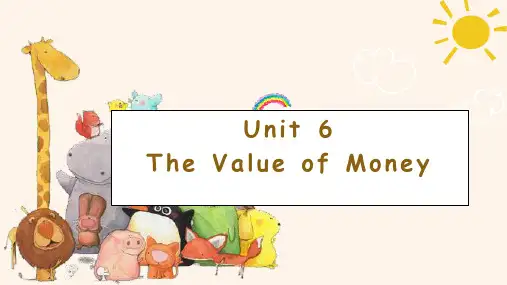
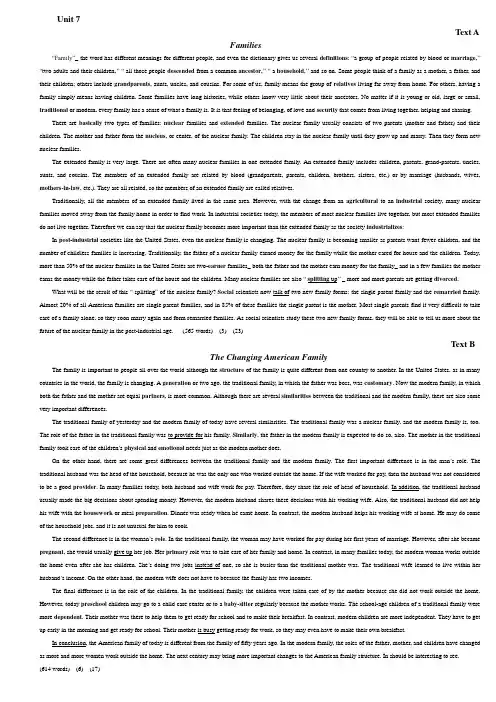
Unit 7T ext AFamilies“Family”_ the word has different meanings f or different people, and even the di ctionary gives us sev eral definitions: “a group of people related by blood or marriage,’’“two adults and their children,’’“ all those people descended f rom a common ancestor,’’“ a household,’’ and so on. Some people think of a family as a mother, a father, and their children; others include grandparents, aunts, uncles, and cousins. For some of us, family means the group of relatives living far away from home. For others, having a family simply means having children. Some f amilies have long histories, while others know very little about their ancestors. No matter if it is young or old, large or small, traditional or modern, every f amily has a sense of what a f amily is. It is that f eeling of belonging, of love and security that comes f rom living together, helping and sharing.There are basically two types of families: nuclear families and extended f amilies. The nuclear family usually consists of two parents (mother and f ather) and thei r children. The mother and f ather f orm the nucleus, or cent er, of the nuclear family. The children stay in the nuclear f amily until they grow up and marry. Then they f orm new nuclear families.The extended f amily is very large. There are of t en many nuclear families in one extended f amily. An extended f amily includes children, parents, grand-parents, uncles, aunts, and cousins. The members of an extended f amily are related by blood (grandparents, parents, children, brothers, sisters, etc.) or by marriage (husbands, wives, mothers-in-law, etc.). They are all related, so the members of an extended f amily are called relatives.Traditionally, all the members of an extended family lived in the same area. However, with the change from an agricultural to an industrial society, many nuclear families moved away from the f amily home in order to f ind work. In industrial societies today, the members of most nuclear families live together, but most extended f amilies do not live together. Theref ore we can say that the nuclear family becomes more important than the extended f amily as the society industrializ es: In post-industrial societies like the United States, even the nuclear f amily is changing. The nuclear family is becoming smaller as parents want f ewer children, and the number of childless families is increasing. Traditionally, the f ather of a nucl ear family earned money f or the family while the mother cared for house and the children. Today, more than 50% of the nuclear f amilies in the United States are two-earner families_ both the f ather and the mother earn money f or the f amily_ and in a f ew families the mother earns the money while the f ather takes care of the house and the children. Many nuclear f amilies are also “splitting up’’ _ more and more parents are getting divorced.What will be the result of this “ splitting”of the nuclear f amily? Social scientists now talk of two new f amily f orms: the single parent f amily and the remarried f amil y. Almost 20% of all American f amilies are single parent f amilies, and in 85% of these f amilies the single parent is the mother.Most single parents f ind it very dif f i cult to take care of a f amily alone, so they soon marry again and f orm remarried f amilies. As social scientists study these two new f amily f orms, they will be able to tell us more about the f uture of the nuclear family in the post-industrial age. (565 words) (3) (23)T ext BThe Changing American FamilyThe f amily is important to people all over the world although the structure of the family is quite different from one count ry to another. In the United States, as in many countries in the world, the f amily is changing. A generation or two ago, the traditional f amily, in which the f ather was boss, was customary. Now the modern f amily, in which both the f ather and the mother are equal partners, is more common. Although there are several similarities between the traditional and the modern f amily, there are also some very important diff erences.The traditional f amily of yesterday and the modern f amily of today have several similarities. The traditional f amily was a nuclear f amily, and the modern f amily is, too. The role of the father in the traditional f amily was to provide f or his f amily. Similarly, the f ather in the modern family is expected to do so, also. The mother in the traditional family took care of the children’s physical and emotional needs just as the modern mother does.On the other hand, there are some great diff erences between the traditional f amily and the modern f amily. The f irst important dif ference is in the man’s role. The traditional husband was the head of the household, because he was the only one who worked outside the home. If the wi f e worked f or pay, then the husband was not considered to be a good provider. In many f amilies today, both husband and wif e work f or pay. Theref ore, they share the role of head of household. In addition, the traditional husband usually made the big decisions about spending money. However, the modern husband shares these decisions with his working wi fe. Also, the traditional husband did not help his wif e with the housework or m eal preparation. Dinner was ready when he cam e home. In contrast, the modern husband helps his working wife at home. He may do some of the household jobs, and it is not unusual f or him to cook.The second diff erence is in the woman’s role. In the traditional f amily, the woman may have worked f or pay during her f irst years of marriage. However, af ter she becam e pregnant, she would usually give up her job. Her primary role was to take care of her family and home. In contrast, in many f amilies today, the modern woman works outside the home even af ter she has children. She’s doing two jobs instead of one, so she is busier than the traditional mother was. The traditional wif e learned to live within her husband’s income. On the other hand, the modern wif e does not have to because the f amily has two incomes.The f inal difference is in the role of the children. In the traditional f amily, the children were taken care of by the mother because she did not work outside the home. However, today preschool children may go to a child care center or to a baby-sitter regularly because the mother works. The school-age children of a traditional f amily were more dependent. Their mother was there to help them to get ready f or school and to make their breakfast. In contrast, modern children are more independent. They have to get up early in the morning and get ready f or school. Their mother is busy getting ready f or work, so they may even have to make their own breakfast.In conclusion, the American family of today is diff erent f rom the f amily of f i f ty years ago. In the modern f amily, the roles of the f ather, mother, and children have changed as more and more women work outside the home. The next century may bring more important changes to the American f amily structure. In should be interesting to see.(614 words) (6)(17)。
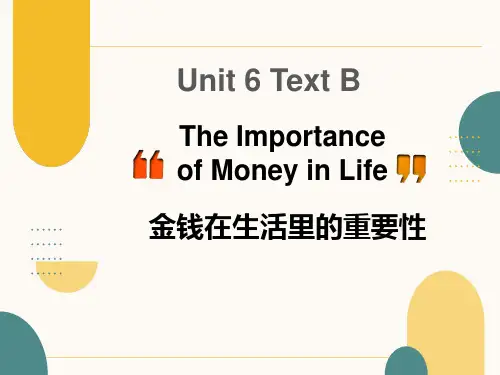
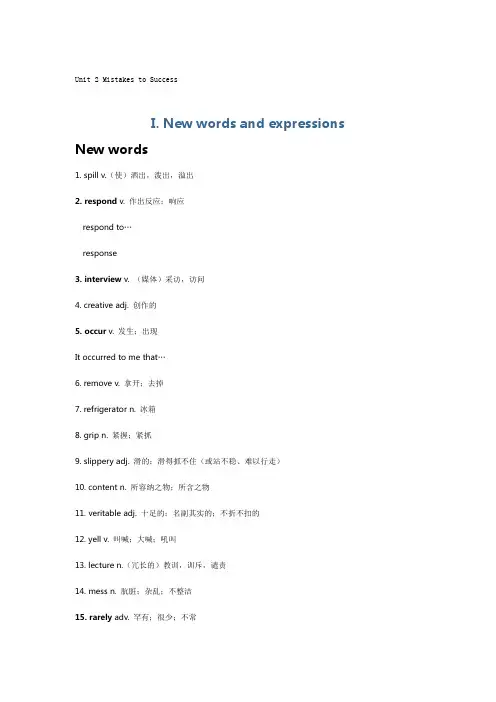
Unit 2 Mistakes to SuccessI. New words and expressions New words1. spill v.(使)洒出,泼出,溢出2. respond v. 作出反应;响应respond to…response3. interview v. (媒体)采访,访问4. creative adj. 创作的5. occur v. 发生;出现It occurred to me that…6. remove v. 拿开;去掉7. refrigerator n. 冰箱8. grip n. 紧握;紧抓9. slippery adj. 滑的;滑得抓不住(或站不稳、难以行走)10. content n. 所容纳之物;所含之物11. veritable adj. 十足的;名副其实的;不折不扣的12. yell v. 叫喊;大喊;吼叫13. lecture n.(冗长的)教训,训斥,谴责14. mess n. 肮脏;杂乱;不整洁15. rarely adv. 罕有;很少;不常rare animals / stampsRarely is he late for class.16. puddle n. 水洼;小水坑17. eventually 最后;终于18. restore v. 使复原;使复位;使复职19. sponge n. 海绵块20. effectively adv. 有效地effectiveineffective注意区分:effective / efficient21. tiny adj. 极小的;微小的22. discover v. 了解到;认识到;查明discovery23. grasp v. 抓紧;抓牢24. lip n.(容器或凹陷地方的)边,边沿25. renowned adj. 有名的;闻名的;受尊敬的26. remark v. 谈论;评论27. opportunity n. 机会;时机28. scientific adj. 科学(上)的;关于科学的sciencescientist例如:The medical science is making great progress in the treatment of cancer.You should provide scientific evidence instead of subjective evidence to prove this theory holds water.Several world-renowned scientists will be invited to attend the forum.29. valuable adj. 很有用的;很重要的;宝贵的Phrases and Expressions1. in this manner 用这种方式2. set…apart from 区别;使与众不同II. Text LearningSpilt Milk① Have you heard of the story about split milk? (1)Well, we all know there is no use crying over split milk. But this story is different. I would hope all parents would respond in this manner.② I recently heard a story about a famous research scientist(研究科学家,高级研究员)who had made several very important medical breakthroughs. (2)He was interviewed by a newspaper reporter who asked him why he was so much more creative than the average person; what set him so far apart from others?③ He responded that, in his opinion, it all came from an experience with his mother that occurred when he was about two years old. (3)He had been trying to riove a bottle of milk from the refrigerator when he lost his grip on the slippery bottle and it fell, spilling its contents all over the kitchen floor - a veritable sea of milk!④When his mother came into the kitchen, instead of yelling at him, giving him a lecture, or punishing him, she said," (4)Robert, what a great and wonderful mess you have made! I have rarely seen such a huge puddle of milk. Well, the damage has already been done. Would you like to getdown and play in the milk for a few minutes before we clean it up?"⑤ Indeed, he did. After a few minutes, his mother said,"You know, Robert, whenever you make a mess like this, eventually you have to clean it up and restore everything to its proper order. So, how would you like to do that? We could use a sponge, a towel, or a mop. Which do you prefer?" he chose the sponge and together they cleaned up the spilt milk.⑥ His mother then said, "You know, what we have here is a failed experiment in how to effectively carry a big milk bottle with two tiny hands. Let's go out in the back yard and fill the bottle with water and see if you can discover a way to carry it without dropping it." (5)The little boy learned that if he grasped the bottle at the top near the lip with both hands, he could carry it without dropping it. Whata wonderful lesson! (承上总结句)⑦ (6)The renowned scientist riarked that it was at that moment that he knew he didn't need to be afraid to make mistakes. (7)Instead, he learned that mistakes were just opportunities for learning something new, which is, after all, what scientific experiments are all about. Even if the experiment "doesn't work," we usually learn something valuable from it.⑧ (8)Wouldn't it be great if all parents would respond the way Robert's mother responded to him? 本文重点及难点:1. Well, we all know there is no use crying over split milk.There / It is no use crying over spilt milk. 覆水难收。
Unit 1 The Power of LanguageText A Critial ReadingExercises1,Checking Your prehension.1,B 2,A 3,D 4,A 5,C2, Building Your Vocabulary.1,consistent (be consistent with...与...相符)2,statement3, reflect4,invalid5,considerably6,parisonSection B1, credible 2, identify 3, assumption4, represents 5, evaluated 6, appropriateSection C1, to 2, forth 3, into 4, on 5, with 6, to3, Bridging the Gap1, defines 2, action 3,tears 4, good5, express 6, powerful 7, internally8, shapes 9, responds to 10, personal4,Translation1, take interests of different social groups into accuount.2, pare the recent work with the previous one3, was not consistent with statement to the police4, was not relevant to the affair5, Please inform us of any change in your caseSection B为了成为一名灵活的读者,你需要知道怎样选择和使用阅读方式,来与你的阅读目的相一致。
懂得何时以及怎样选用不同的阅读方式会使你成为一个灵活的读者。
自考英语二教材课文讲义u n i t文档编制序号:[KK8UY-LL9IO69-TTO6M3-MTOL89-FTT688]Unit 1 The Power of Language?I. New words and expressions New words1. critical adj. 有判断力的;判断公正(或审慎)的2. non-fiction n. 纪实文学3. position n. 观点;态度;立场4. statement n. 说明;说法;表态5.?question?v. 表示疑问;怀疑out of question / out of the question6. evaluate v. 估计;评价;评估7. context n. 事情发生的背景,环境,来龙去脉8.?value?n. values [pl.]是非标准;价值观valuableinvaluable=pricelessvalueless9. represent?v. 描述;表现representative adj./n.10. assertion n. 明确肯定;断言11. sufficient?adj.?足够的;充足的sufficiencyinsufficient12. statistic n. statistics [pl.]统计数字;统计资料13. integrate v.(使)合并,成为一体14. authority?n.专家;学术权威;泰斗an/the authority on sth.authorize15. compare?v. 比较;对比compare A with Bcompare A to B16. subject n. 主题;题目;题材17. consistent adj. 相符的;符合的18. inconsistency n. 不一致19. assumption n. 假定;假设20. case?n. 具体情况;事例in casein case of firein case that…a case in pointconfirmed/suspected cases21. directly adv. 直接地;径直地22. identify v. 找到;发现23. valid?adj. 符合逻辑的;合理的;确凿的validity n. 有效性,正确(性)invalid24. credible?adj. 可信的;可靠的incredible=unbelievable25. landmark n.(标志重要阶段的)里程碑26. relevant?adj. 紧密相关的;切题的relevancy n. 关联;恰当irrelevant27. current adj. 现时发生的;当前的28. appropriate?adj. 合适的;恰当的inappropriateIt's (not) appropriate that ….29. bias n. 偏见;偏心;偏向30. considerably?adv. 非常;很;相当多地considerconsideringconsiderableconsiderateconsideration31. Democrat n. (美国)民主党党员,民主党支持者民32. Republican n. (美国)共和党党员,共和党支持者33. reflect v. 显示;表明;表达34. informed?adj. 有学问的;有见识的well-informedill-informedPhrases and Expressions1. apply to 使用;应用2. put forth 提出;产生3. take … into account 考虑到;顾及4. accept/take … at face value 相信表面;信以为真5. with a grain of salt 有保留地;持怀疑态度地II. Text LearningCritical Reading①?(1)Critical reading?applies to?non-fiction writing?in which?the author?puts forth a position?or seeks to make a statement.?Critical reading is active reading. It involves more than just(不只是,不仅仅是) understanding what an author is saying. Critical reading involves questioning and evaluating what the author is saying, and forming your own opinions about what the author is saying.?Here are the things you should do to be a critical reader.(启下句)本部分重点及难点:1. Critical reading?applies to?non-fiction writing?in which?the author?puts forth a position?or seeks to make a statement. apply to sb./sth.= be applicable to sb./sth.apply的派生词:application, applicant, applicable②?Consider the context of what is written. You may be reading something that was written by an author from a different cultural context?than?yours.?(2)Or, you may be reading something written?some time?ago in a different time context than yours.?(3)In either case, you must recognize and take into account any differences between your values and attitudes and those represented by the author.?本部分重点及难点:2. Or, you may be reading something written?some time?ago in a different time context than yours.some time注意区分:sometime / sometimes / some times3.?In either case, you must recognize and?take into account?any differences between your?values andattitudes?and?those?represented by the author. 不论哪种情况,你必须注意并考虑你的价值观和态度与作者所述的价值观和态度有何不同。
自考英语二自学教程答案(纯答案)Unit1课后习题参考答案Text AI . 1. B 2. A 3.D 4.A 5.CII . Section Al. Consistent 2. Statement 3. Reflect 4. Invalid 5. Considerably 6 comparisonSection B1 . Credible 2. Identify 3. Assumptions 4. Represents 5 evaluated 6. ApproriateSection C1. to2.forth3.into4.for5.with6.toⅢ.1. define 2.action 3.tears 4. good 5.express 6.powerful 7. internally 8.shape 9.responds to 10. personal Ⅳ.Section A1. take interests of different social groups into account2. Compare the recent work with the previous work3. was not consistent with his statement to the police4. was not relevant to the matter being dealt with5. Please inform us of any change in vour case .-.Section B想成为灵活的读者,就要知道如何选择和使用阅读风格,这种阅读风格与你的阅读目的是一致的。
知道在不同时间以不同方式使用不同的阅读风格,这样就可以成为灵活的读者。
研究阅读就是灵活读者采用的阅读风格,他们希望借此充分理解难度较大的文章。
采用阅读风格,你就要放慢阅读速度,而且在阅读时还要挑战自我,力求理解文章的内涵。
⾃考英语⼆课后习题答案《⼤学英语⾃学教程》(上册)课后习题答案(珍藏版)Unit 1 (2)Text A (2)Text B (3)Grammar Exercises (4)Unit 2 (5)Text A (5)Text B (5)Grammar Exercises (6)Unit 3 (6)Text A (6)Text B (7)Grammar Exercises (7)Unit 4 (9)Text A (9)Text B (9)Grammar Exercises (10)Unit 5 (11)Text A (11)Text B (11)Grammar Exercises (12)Unit 6 (12)Text A (12)Text B (13)Grammar Exercises (13)Unit 7 (14)Text A (14)Text B (15)Grammar Exercises (16)Unit 8 (16)Text A (16)Text B (17)Grammar Exercises (18)Text B (19) Grammar Exercises (20) Unit 10 (21)Text A (21)Text B (22) Grammar Exercises (22) Unit 11 (23)Text A (23)Text B (24) Grammar Exercises (24) Unit 12 (25) Grammar Exercises (26) Unit 13 (27)Text A (27)Text B (27) Grammar Exercises (28) Unit 14 (28)Text A (28)Text B (29) Grammar Exercises (30) Unit 15 (30)Text A (30)Text B (31) Grammar Exercises (32) Unit 16 (33)Text A (33)Text B (34) Grammar Exercises (34) Unit 17 (35)Text A (35)Text B (36) Grammar Exercises (37) Unit 18 (37)Grammar Exercises (39) Unit 19 (39)Text A (39)Text B (40) Grammar Exercises (41) Unit 20 (41)Text A (41)Text B (42) Grammar Exercises (43) Unit 21 (43)Text A (43)Text B (44)Unit 22 (45)Text A (45)Text B (45)Unit 23 (46)Text A (46)Text B (47)Unit 24 (48)Text A (48)Text B (49)Unit 25 (50)Unit 1Text AExercises for the Text I.1.d2.a3.c4.d5.dII.1.task5.conclusion6.repeat/doc/d6*******.htmlmunicate8.purpose9.probably 10.outline III.1.Instead of2.therefore3.more...than4.even5.First of all6.because7.on the other hand8.finally9.lookingfor 10.ConverselyIV.1.Research shows that successful language learners are similar in many ways./doc/d6*******.htmlnguage learning is active learning.Therefore,successful learners should look for every chance to use the language. /doc/d6*******.htmlnguage learning should be active,independent and purposeful.4.Learning a language is different from learning maths.5.The teacher often imparts successfull language learning experiences to us. Vocabulary ExercisesI.1.a.success b.successful c.successfully2.a.indepence b.depend c.dependent3.a.covered b.uncover c.discovered4.a.purposeful b.purposefully c.purposeII.1.inexact2.technique3.outlined/doc/d6*******.html7.intelligent 8.incomplete 9.similar10.statementIII.1.disagree2.independent3.incomplete4.inexact5.uncoverIV.1.They find it hard to master a foreign language.2.The research shows that successful men are similar in many ways.3.Successful language learners do not only depend on the book or the teacher.4.We are willingto help our friends.5.We should learn new things independently,actively,and purposefully.Text BExercises for the TextI.1.T2.F3.T4.F5.T6.F7.F8.F9.T 10.F II.1.With the help of their fingers2."I am thirsty."3.tea,coffee,wine,beer and soda-water4.Put his hands on his stomach5.nothing but drinks6.much more exact7.meanings and can be put together into sentences8.form new sentences9.talk10.speakVocabulary ExercisesI.1.b2.a3.c4.e5.dII.1.B2.A3.B4.D5.A6.A7.C8.C9.C 10.B Grammar ExercisesI.whether 连词towards 介词second 数词 hour 名词repeat 动词 successful 形容词not 副词probably 副词than 连词 because 连词which 连词 even 副词intelligent 形容词 differ 动词regular 形容词 some 形容词/代词/副词into 介词 oh 感叹词seem 系动词 communicate 动词II.1.Let 动词round 介词2.fresh 形容词for 介词3.leave 名词call 动词on 介词if 连词spare 动词4.Even 副词it 代词5.Where 连接副词will 名词6.after 介词calm 名词7.seem 系动词those 代词makes 名词8.without 介词return 名词9.strict 形容词work 动词10.news 名词live 形容词meeting 名词III.(斜体为主语,带下划线的为谓语)1.Most adults would disagree with this statement.2.How much time did they allow you for doing the work.3. I had a visit from Mary yesterday.4. China's stand on this questionis clear to all.5.Warm clothes protest against the cold of winter.6.What we need is more practice.7.There doesn't seem to be much chance of my getting job.8.In those days the cost of living rose by nearly 4 percent.9.There are a number of people interested in the case.10.Every means has been tried but without much result.IV.1.a magazine (宾语)last night (状语)2.in need (定语)indeed (定语)3.outside your area (定语)telephoning long distance (主语补⾜语)4.your children (宾语)all day (状语)5.his direction (宾语)French (宾语)6.me (宾语)plenty of exercises (不定式宾语)7.long (宾语)to London (状语)8.those (宾语)who help themselves (从句作定语)9.her (宾语)above others (宾语补⾜语)10.to build a hotel in the village (定语)of the foreigners (定语)Unit 2Text AExercises for the TextI.1.a2.c3.a4.a5.cII.1. Income tax is a certain percentage of the salaries paid to the goverment.2. Graduated income tax means the percentage of the tax(14 to 70 percent) increases as a person's income increase.3. Property tax is that people who own a home have to pay taxes on it.4. Exercise tax is charged on cars in a city.5. Sales tax is a percentage charged to any item which you buy in that state. III.1.due2.depends on3.diverse4.consists of5.simila6.tendsto /doc/d6*******.htmlplaining about 8.In addition to 9.issue 10.agreed onIV.1.How much do you charge for a haircut.2.We are trying to use funds for the Red Cross.3.He has earned a good reputation for honsety.4.We pay taxes in exchange for government services.5.An open letter protests the government's foreign policy.V.。
矿产资源开发利用方案编写内容要求及审查大纲
矿产资源开发利用方案编写内容要求及《矿产资源开发利用方案》审查大纲一、概述
㈠矿区位置、隶属关系和企业性质。
如为改扩建矿山, 应说明矿山现状、
特点及存在的主要问题。
㈡编制依据
(1简述项目前期工作进展情况及与有关方面对项目的意向性协议情况。
(2 列出开发利用方案编制所依据的主要基础性资料的名称。
如经储量管理部门认定的矿区地质勘探报告、选矿试验报告、加工利用试验报告、工程地质初评资料、矿区水文资料和供水资料等。
对改、扩建矿山应有生产实际资料, 如矿山总平面现状图、矿床开拓系统图、采场现状图和主要采选设备清单等。
二、矿产品需求现状和预测
㈠该矿产在国内需求情况和市场供应情况
1、矿产品现状及加工利用趋向。
2、国内近、远期的需求量及主要销向预测。
㈡产品价格分析
1、国内矿产品价格现状。
2、矿产品价格稳定性及变化趋势。
三、矿产资源概况
㈠矿区总体概况
1、矿区总体规划情况。
2、矿区矿产资源概况。
3、该设计与矿区总体开发的关系。
㈡该设计项目的资源概况
1、矿床地质及构造特征。
2、矿床开采技术条件及水文地质条件。